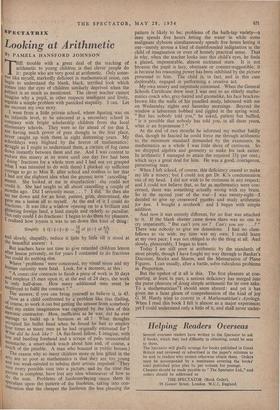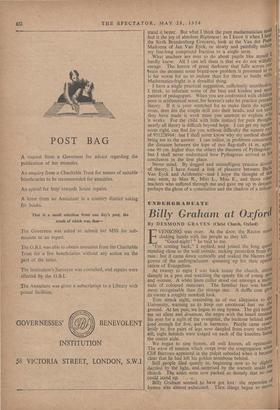14 PECTATRIX
Looking at Arithmetic
hY PAMELA HANSFORD JOHNSON HE trouble with a great deal of the teaching of arithmetic to young children is that clever people do it: people who are very good at arithmetic. Only some- Lone like myself, markedly deficient in mathematical sense, can ceein to understand the blank, black, terrified look which comes into the eyes of children similarly deprived when the Subject is so much as mentioned. The clever teacher cannot irnagine why a pupil, in other respects intelligent and lively, regards a simple problem with panicked stupidity. I can. Let the recount my own story. I went from a little private school, where figuring was on an infantile level, to be educated at a secondary school in company with bright scholarship children from the local elementary schools. They were so far ahead of me that I, not having much power of pure thought in the first place, never caught up with them in eight distressing years. My schooldays were blighted by the horror of mathematics: struggle as I might to understand them, a curtain of fog came down instantly between them and me. And I was content to endure this misery at its worst until one day (we had been doing' fractions for a whole term and I had not yet grasped What I was intended to do with them) I plucked up sufficient courage to go to Miss R. after school and Confess to her that I had not the slightest idea what the gnomic term ' cancelling ' Meant. She looked at me in stupefaction: she could- not credit it. She had taught us all about cancelling a couple of months ago. Did I seriously mean. . . ? I did. So then she sat me down and for an hour, patient, grim, determined, she gave me a lesson all to myself. At the end of it I could do fractions. It was like a window opening on to a brilliant and Oittering foreign land, a land simple and orderly as paradise. !Not only could I do fractions: I began to do them for pleasure. realised how joyous it was to set down this kind of thing:
la Simplify § (§x §+§±§) — 6§ 3§ and slowly, shapelily, reduce it little by little till it stood at the beautiful answer: 1.
But teachers have not time to give retarded children lesson after lesson privately, so for years I continued to do fractions but could do nothing else. Where ` problems ' were concerned, my visual sense and my unman curiosity were fatal. Look, for a moment, at this: "A contre.ctor contracts to finish a piece of work in 30 days nd employs 15 men upon it; at the end of 24 days, the work is only half-done. How many additional men must be employed to fulfil' the contract ? " The answer, if you can bring yourself to believe it, is 45. Now as a child confronted by a problem like that (failing, of Course, to work it out but getting the answer from somebody eise) my entire imagination was captured. by the idea of this Moronic contractor. How, inefficient as he was, did he ever manage to build up a business at all ? What thoughts °ccupied his bullet head when he found he had to employ four times as many men as he had originally estimated for ? hat did he look like? (A fiat-faced fellow, I imagine, with °w and beetling forehead and a scrape of pale, unsuccessful 111, onstache; a smart-aleck touch about him and, of course, a `Mich of the pitiable. A man who boasted in public houses.) The reason, why so many children more or less gifted in the arts are so poor at mathematics is that they are too young and too weak-minded to subdue their artistic impulses. They turn every possible sum into a picture, and by the time the Picture is complete, have lost any idea whatsoever of how to 10 the sum. Problems of linoleum-laying cause them to aPeculate upon the pattern of the linoleum, taking into con- 4Icleration that the cheaper the linoleum the less pleasing the pattern is likely to be; problems of the bath-tap variety—a ; man spends five hours letting the water in while some malignant slyboots simultaneously spends five hours letting it out—merely arouse a kind of dumbfounded indignation in the child of imagination or even of homely practical sense. That is why, when the teacher looks into this child's eyes, he finds a glazed, impenetrable, almost nictitated stare. It is not because the pupil is lazy, obstinate or counter-suggestible; it is because his reasoning power has been inhibited by the picture presented to him. The child is, in fact, and in this case deplorably, engaged in performing a creative act.
My own misery and ineptitude continued. When the General Schools Certificate drew near I was sent to an elderly mathe- matics coach who, grey-haired and gnomelike, his face bracken- brown like the walls of his panelled study, laboured with me on Wednesday nights and Saturday mornings. Beyond the window a laburnum bobbed and jiggled in the spring wind. "But has nobody told you," he asked, patient but baffled, "is it possible that nobody has told you, in all these years, what is an hypotenuse ? "
At the end of two months he informed my mother baldly that, though he fancied he could force me through arithmetic to, the minimum standard demanded by the examiners, in mathematics as a whole I was little short of cretinous. So we dropped algebra and geometry to make his task eagier. In arithmetic I managed to attain the required 331 per cent.; which says a great deal for him. He was a good, courageous, persevering man.
.When [left school, of course, this deficiency ceased to make my life a misery; but I could not get Dr. K.'s condemnation out of my head. I did not wish to be cretinous in any respect; and I could not believe that, so far as mathematics were con- cerned, there was something actually wrong with my brain. So in the second year of the war—I was twenty-eight—I decided to give up crossword puzzles and study arithmetic for fun. 1 bought a textbook : and I began with• simple addition.
And now it was entirely different, for no fear was attached to it. If the blank shutter came down there was no one to cry impatiently, "But can't you see? Can't you see . . .?" There was nobody to give me detentions. I had no class- fellows to vie with; my time was my own; I could learn at my own pace; I was not obliged to do the thing at all. And • slowly, pleasurably, I began to learn.
Today I am still poor at arithmetic by the standards of most people, though I have fought my way through to Banker's Discount, Stocks and Shares, and the Mensuration of Plano Figures. I can usually, after a battle, solve ridiculous problems in Proportion.
But the upshot of it all is this. The first pleasure at con- quering, at least in part, a serious deficiency has merged into the purer pleasure of doing simple arithmetic for its own sake. To a rnathematiciarn should seem absurd : and yet it has given me a faint gleam of comprehension of the kind of joy G. H. Hardy tried to convey in A Mathematician's Apology. When I read this book I felt it almost as a major experience. yet I could understand only a little of it, and shall never under. stand it better. But what I think the pure mathematician ni feel is the joy of absolute Rightness: as I know it when I 11 the Sixth Brandenburg Concerto, look at the Van der Pa Madonna of Jan Van Eyck, or slowly and painfully rech my line-long compound fraction to a single term. What teachers are ever to do about pupils like mysel hardly know. All I can tell them is that we do not wilfu enrage. The, horror of great darkness that falls across ( brain the moment some brand-new problem is presented to. is far worse for us to endure than for them to battle WI Mathematics-fright is a dreadful thing. I have a single practical suggestion, sufficiently unorthod I think, to infuriate some of the best and kindest and in patient of pedagogues. When you are confronted with child, poor in aritlunetioal sense, for heaven's sake let practice preel • theory. If it is your wretched lot to make them do squ roots, then din the simple drill into their heads, and not ul they have made it work must you attempt to explain 11 it works. For the child with little instinct for pure thoui nearly all theory is difficult beyond hope. I can get my squ roots right, can find for you without difficulty the square of 951228964: but I shall never know why my method sho bring me to the answer. I can utilise, in problems concern the distance between the tops of two flag-staffs (4 m. ap: one 90 cm. higher than the other) the theorem of Pythagori but I shall never understand how Pythagoras arrived at conclusion in the first place.



































































 Previous page
Previous page